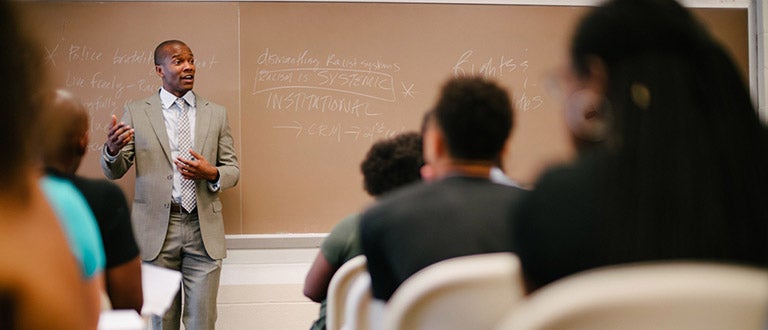Patterson Heads Up African American Studies Major

Professor Robert J. Patterson, Chair of Georgetown College’s African American Studies department, welcomes his first class of the semester (photo by Kuna Malik Hamad).
September 7, 2016 — Last week, University President John J. DeGioia delivered the introductory remarks for Georgetown’s Conversation on Slavery, Memory and Reconciliation. Prominent among his list of university decisions and initiatives — all aimed at acknowledging and confronting the legacy of slavery at Georgetown — was the establishment of an African American Studies Department and corresponding major.
Georgetown follows the lead of many of its peer institutions in certifying African American Studies as a full-fledged academic department. But the circumstances surrounding Georgetown’s decision place it directly in the national spotlight more than any of its peers.
Over the past year, Georgetown has confronted the role slavery played in its establishment and development in a manner unprecedented in the academic world. Responding to student concerns about the names of two buildings named for former university presidents associated with major sales of enslaved people, the university commissioned the Working Group on Slavery, Memory and Reconciliation to consider how it should move forward. That working group’s recommendations have set in motion a series of groundbreaking initiatives that may well serve as a case study in how centuries-old American institutions treat their relationship to slavery.
DeGioia also constituted the Racial Justice Working Group, which focused on the specific academic and research components of the university’s broader racial justice initiative. Out of this working group — co-chaired by Provost Robert Groves, Professor Gwendolyn Mikell, and Professor Robert J. Patterson — a unanimous recommendation for a Department of African American Studies emerged.
The upgrade of the African American Studies program will have an immediate and tangible effect on undergraduate academic life on the Hilltop. We sat down with Professor Patterson (C’02), who is tasked with determining the department’s priorities and direction as it takes this important step.
*******
Patterson studied English as an undergraduate and spent much of his career as a professor of English, first at Florida State and then here at Georgetown College. He soon found that an in-depth study of the African American experience involved much of his English training — first while receiving his Ph.D. in African American Literary and Cultural Studies from Emory University, and then while researching and writing his first book.
“The work that I do necessarily draws on the methodologies, the theoretical paradigms, the texts that other disciplines use,” he said. “In many respects, the interdisciplinary nature of African American Studies since its inception in the 1960s made a smooth parallel [to English.]”
Patterson has been involved with the African American Studies program in some capacity since becoming a full-time faculty member in 2011. In 2013, he was chosen to direct the program — which offered only a minor — and soon began laying the groundwork for an upgrade to a full major. The same wave of student activism that provoked Georgetown to establish its Working Groups also fueled his cause, and in 2016 he was named to head the brand-new department.
“The student activism that was going on in the United States on college campuses in the fall of 2015 definitely swayed the pendulum some,” Patterson said. “But these conversations had been happening.”
*******
So, say you’ve chosen to major in African American Studies. What will you be doing?
“As with most majors, we’re looking at both the content and the skillset,” Patterson said.
The major will feature two tracks: one focused on history, behavioral science, and social inquiry; the other focused on literature, language, arts, and culture. The goal is for students to gain both a depth of learning within their concentrations and a breadth of learning across concentrations, so major requirements will require courses outside one’s specific focus.
“The idea is to produce a well-rounded scholar who has a sense of the discipline and its methodologies, and who can have these conversations across disciplinary formations, across texts, across time periods,” Patterson said.
While other institutions have much older African American Studies departments, Patterson hopes Georgetown’s longstanding focus on eradicating social and political inequalities — and its tradition of producing students with a passion for social justice causes — will help distinguish his department.
“We’re not producing docile subjects — we want people who can think energetically, creatively, innovatively about specific ways to eradicate inequality,” Patterson said.
*******
Patterson emphasizes that while it focuses on a particular demographic experience, African American Studies is neither a segregating force nor a niche discipline. Students who aren’t African American have completed the minor, and applications of the study aren’t limited to the academic world.
Why African American Studies? To “eradicate inequality” and solve the problems Patterson and like-minded students want to solve, why not simply study economics or sociology?
For Patterson, it’s about the unique nature of the African American experience and its massive trove of cultural production that must continue to be subjected to rigorous academic study.
“The African American experiences are constituent features of the United States and global cultures,” Patterson said. “To have an understanding of its past, present and future requires an engaged and sustained study — that’s theoretical, practical, and research-oriented.”
“There’s a broad archive that has yet to be exhausted. … It’s constantly being uncovered, and we want to be a part of uncovering it, in all its newness and innovation, and articulating that.”
Read more about the African American Studies Department here, and read the findings of the Working Group on Slavery, Memory and Reconciliation here.